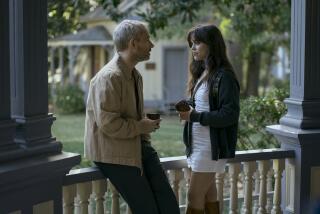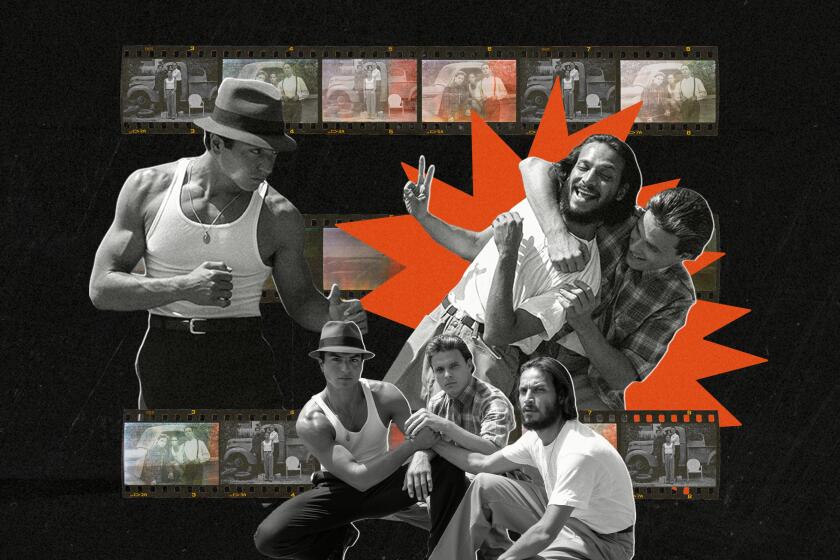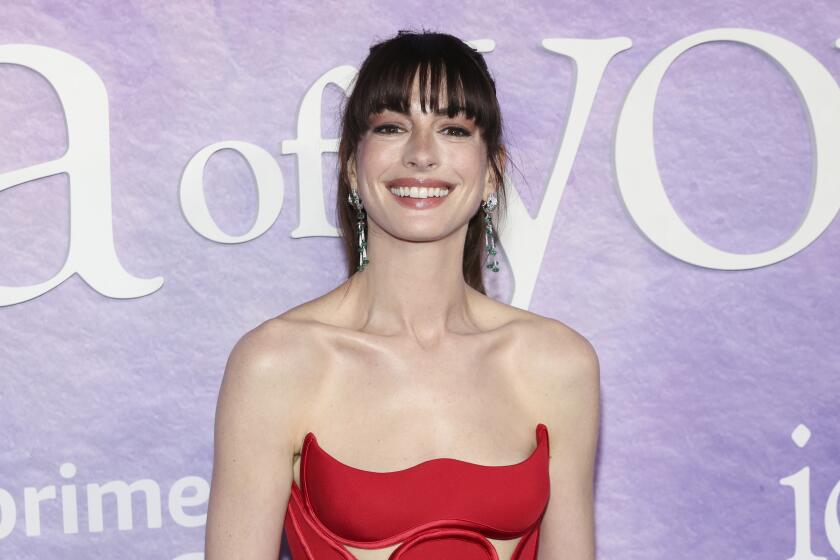Now it’s the ladies’ turn to act like slobs
In America’s movie theaters, this has been the summer of women behaving badly: Kristen Wiig as an underachieving maid of honor who trashes her friend’s bridal shower in “Bridesmaids”; Cameron Diaz as a pot-smoking middle school teacher handing her bra to a student in “Bad Teacher”; Jennifer Aniston as a sexually predatory dentist harassing her male assistant in “Horrible Bosses.” Still to come: Anna Faris as a hard-partying slacker with a long list of exes in September’s “What’s Your Number?”
The female characters in all these films swear, drink and leap into the sack with gusto, as well as engage in potty humor and -- perhaps most radically for Hollywood -- deliver the funniest lines, few of them printable here. Their success at the box office -- “Bridesmaids” has grossed more than $200 million worldwide -- has ignited debate within the industry and in cultural circles about the raunchy new high -- or low -- women are hitting in screen comedy right now.
For many viewers and the actresses themselves, these anti-heroines, by emulating the crudeness that long has spelled box-office gold for men in R-rated comedies like “The Hangover” and “Knocked Up,” represent a refreshing break from the sexy potential one-night stands, perky potential girlfriends or shrill potential ex-wives women frequently play in mainstream comedies.
But after the box-office receipts are tallied, the question lingers: Is the right to crack a fart joke a progressive sign of loosening gender strictures or a mark of the devolution of the broader culture?
For women under 40 in particular, who grew up with not only the option but the responsibility of breadwinning -- as well as images of actresses saving the world in short-shorts -- there’s a relief in seeing female sloth and imperfection on screen.
“I’m very intrigued by playing women who are much more like men: messy and sloppy,” said Faris, who, at 34, was born after Roe vs. Wade, Title IX and the TV premiere of “Charlie’s Angels.”
“Young men that I know that I went to college with ... they kind of were losers.... I think the reaction to that was a lot of type-A women: the perfect shoes, the perfect job, the baby, the husband, just driven, driven, driven. Not allowed to screw up. I just want to see the women that screw up,” Faris added.
Wiig, co-writer as well as star of “Bridesmaids,” noted, “On some levels, women and men may find different things funny that relate to their own sex. One thing we wanted .... was ... to get some sort of a female language in there. The biggest compliment I can get is people relating to some aspect of the character.”
Not everyone, though, sees actresses following the crudeness or indolence of male comics as a sign that women are enjoying new cultural freedom.
“Women cross-dressing our kind of humor as male humor is the worst possible idea,” said Gina Barreca, 54, author of “They Used to Call Me Snow White ... but I Drifted: Women’s Strategic Use of Humor” and professor of English and feminist theory at the University of Connecticut.
“Is this a great new feminist assertion of the self that says, ‘Yes, women fart, women belch, women get drunk? That Cameron Diaz being a disgrace, isn’t that fabulous?’ The feminist ideal was not that there was going to be equity of stupidity. Finding the lowest common denominator is not what everybody was marching for.”
Pushing back
From swooning drunken toasts to vigorous, awkward sex, one thing all of these roles share is a reliance on physical comedy. Camille Paglia, professor of humanities and media studies at the University of the Arts in Philadelphia, who has written extensively (and sometimes with contempt) about feminism, says that physicality is not mere coincidence but expresses the chafing some women feel about societal expectations of responsibility and virtue.
“What slapstick expresses is a kind of freedom of the body,” Paglia said. “You don’t care about decorum, you don’t care how you’re looked at. If slapstick is coming back now for women, is it not a function of a sense of relief, letting it all hang out in this crazy physical way? Young, white, middle-class women feel very constrained right now.”
For decades, Barreca noted, women have been struggling -- in the real world and onscreen -- to get ahead, and there’s some sense of exhaustion with the effort. “Can a woman be an underachiever?” she asked. “Are we allowed to do that now?”
Film isn’t the only medium of late featuring saucy female comic characters fed up with societal expectations.
“Whitney,” a sitcom premiering on NBC after “The Office” this fall, was created by and stars 28-year-old stand-up comic Whitney Cummings. In the pilot, Cummings enacts a naughty nurse fantasy to stave off relationship boredom, gobbles too many cupcakes at a wedding and declares to her boyfriend, “Getting married is dumb. Half of all marriages end. If half of all planes crashed, would you continue to fly?”
“Whitney’s brand of humor is more male-driven,” said Jane Wiseman, senior vice president of comedy at Chernin Entertainment, who helped develop the show while an executive at NBC. “She’s bawdy. She’s crass. She loves her boyfriend but is afraid of marriage. She’s a commitment-phobe.”
The shock of seeing women misbehaving in traditionally male ways drives much of the humor in these TV shows and films.
In “Horrible Bosses,” a comedy about three men trying to kill their employers, Aniston aims her dental water pick at her assistant’s crotch and propositions him while wearing only a lab coat and some thigh-highs.
“People like surprise better than any other thing when it comes to their entertainment, to see a new side of things,” “Horrible Bosses” director Seth Gordon said. “The first feedback we got from test audiences was, ‘It’s so refreshing to see [Aniston] play this character.’ ”
Critics have largely agreed, giving Aniston her best reviews since 2002’s “The Good Girl” -- Roger Ebert praised the actress for scenes where she exhibits “acute comic timing and hilariously enacts alarming sexual hungers.”
In some ways, the women in all these films are exploring personae already brought to the screen by men -- Diaz’s teacher is a narcissistic ne’er-do-well akin to Billy Bob Thornton’s “Bad Santa,” while Wiig and Faris are living out the suspended adolescence that has marked the film careers of Seth Rogen and Adam Sandler.
Yet some see the 2011 crop of women who behave as badly as men as just the latest incarnations in a long cycle.
In 1927, for instance, Mae West’s hit Broadway play “Sex” was advertised with a publicity still of the bosomy actress towering over an apparently defenseless man sprawled in a chair. West’s suggestive shimmy in the show landed her seven days in jail on a charge of “corrupting the morals of youth.”
“Virtue has its own reward,” West would say years later, after a career of conspicuously choosing vice, “but no sale at the box office.”
Paglia noted that “the urban flappers of the ‘20s used rough language in order to shock people, and my generation brought it back in the 1960s, going out of our way to use that language that had been forbidden to respectable, middle-class girls. I thought, ‘OK, we solved that,’ and suddenly it’s back. I consider it a crude technique to establish authority.”
Petite and gross
A notable characteristic of the current cohort of do-as-they-please bad girls is that their dress sizes are near zero.
Compare their physiques with, say, the corpulent Roseanne Barr -- in many ways the mother of the current generation of pop culture bad girls, whose Emmy-winning eponymous sitcom ran from 1988 to 1997.
“We expect Roseanne Barr to belch, fart and spit,” Barreca said. “We expect somebody who weighs more than 140 pounds to do those things. But now it’s got to be the knockout, tiny girl that’s funny.”
The comeliness of these actresses can create a tendency to grade their humor on a curve, according to Lisa Lampanelli, a stand-up comic best known for her expletive-laden rants at Friars Club roasts.
“It’s like saying, ‘Look at that Special Olympian, he really went for it! He finished the race,’ ” Lampanelli said of praise for Diaz’s performance in “Bad Teacher.”
Another question is whether women are playing these masculinized comic roles because they feel freer to behave as badly as guys -- or because they want to pull in male audiences.
Romantic comedies often draw audiences close to 80% female, but “Bridesmaids’ ” opening-weekend crowd was 65% female and 35% male.
Regardless of the audience, Lampanelli said she looks forward to a time when raunchy women are as unremarkable as raunchy men.
“Eventually it’ll stop being fascinating that women are funny or dirty,” Lampanelli said. “Within 20 years, it’ll be, ‘That’s just a comic, not a guy or a girl or a gay guy or a black guy, just a funny person.’ ”
Times staff writer Nicole Sperling contributed to this report.
More to Read
Only good movies
Get the Indie Focus newsletter, Mark Olsen's weekly guide to the world of cinema.
You may occasionally receive promotional content from the Los Angeles Times.







